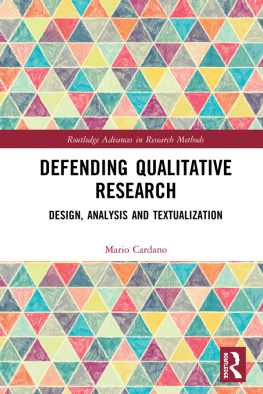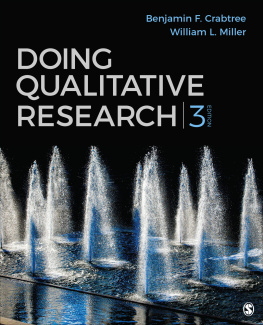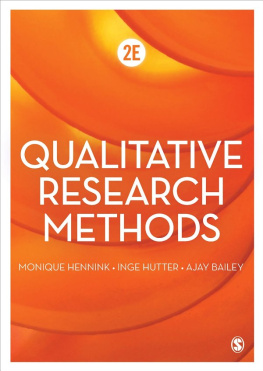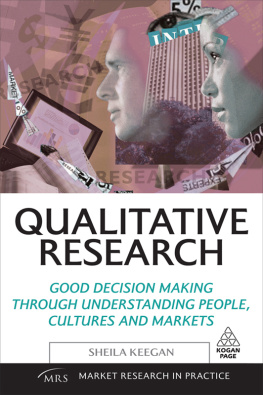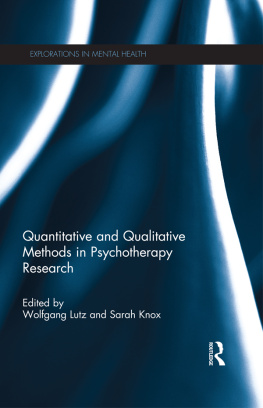Defending Qualitative Research
Focussing on the phases of qualitative research which precede and follow fieldwork design, analysis, and textualization this book offers new theoretical tools to tackle one of the most common criticisms advanced against qualitative research: its presumed lack of rigour. Rejecting the notion of rigour as formulated in quantitative research and based on the theory of probability, it proposes a theoretical frame that allows combining the goals of rigour and that of creativity through the reference to theory of argumentation. As such, it will appeal to scholars and students across the social sciences with interests in qualitative research methods.
Mario Cardano is Full Professor of the Qualitative Methods for Social Research and the Sociology of Health at the Department of Cultures, Politics and Society, University of Turin, Italy.
Routledge Advances in Research Methods
Dialectics, Power, and Knowledge Construction in Qualitative Research
Beyond Dichotomy
Adital Ben-Ari and Guy Enosh
Researching Social Problems
Edited by Amir Marvasti and A. Javier Trevio
Action Research in a Relational Perspective
Dialogue, Reflexivity, Power and Ethics
Edited by Lone Hersted, Ottar Ness and Sren Frimann
Situated Writing as Theory and Method
The Untimely Academic Novella
Mona Livholts
Foundations and Practice of Research
Adventures with Dooyeweerds Philosophy
Andrew Basden
Gambling, Losses and Self-Esteem
An Interactionist Approach to the Betting Shop
Cormac Mc Namara
Institutional Ethnography in the Nordic Region
Edited by Rebecca W. B. Lund and Ann Christin E. Nilsen
Freedom of Information and Social Science Research Design
Edited by Kevin Walby and Alex Luscombe
Defending Qualitative Research
Design, Analysis and Textualization
Mario Cardano
For more information about this series, please visit: www.routledge.com/Routledge-Advances-in-Research-Methods/book-series/RARM
First published 2020
by Routledge
2 Park Square, Milton Park, Abingdon, Oxon OX14 4RN
and by Routledge
52 Vanderbilt Avenue, New York, NY 10017
Routledge is an imprint of the Taylor & Francis Group, an informa business
2020 Mario Cardano
The right of Mario Cardano to be identified as author of this work has been asserted by him in accordance with sections 77 and 78 of the Copyright, Designs and Patents Act 1988.
All rights reserved. No part of this book may be reprinted or reproduced or utilised in any form or by any electronic, mechanical, or other means, now known or hereafter invented, including photocopying and recording, or in any information storage or retrieval system, without permission in writing from the publishers.
Trademark notice: Product or corporate names may be trademarks or registered trademarks, and are used only for identification and explanation without intent to infringe.
British Library Cataloguing-in-Publication Data
A catalogue record for this book is available from the British Library
Library of Congress Cataloging-in-Publication Data
Names: Cardano, Mario, author.
Title: Defending qualitative research : design, analysis and textualization /
Mario Cardano.
Description: Abingdon, Oxon ; New York, NY : Routledge, 2020. | Series:
Routledge advances in research methods | Includes bibliographical
references and index.
Identifiers: LCCN 2019049351 (print) | LCCN 2019049352 (ebook) |
ISBN 9781138614055 (hbk) | ISBN 9780429464232 (ebk)
Subjects: LCSH: ResearchMethodology. | Qualitative research.
Classification: LCC H62 .C34132 2020 (print) | LCC H62 (ebook) | DDC
001.4/2dc23
LC record available at https://lccn.loc.gov/2019049351
LC ebook record available at https://lccn.loc.gov/2019049352
ISBN: 978-1-138-61405-5 (hbk)
ISBN: 978-0-429-46423-2 (ebk)
Typeset in Times New Roman
by Apex CoVantage, LLC
To my sons, Andrea and Emilio
In writing this book, I have contracted numerous intellectual debts that I cannot repay even with these words of acknowledgement. Many of the ideas proposed in this book germinated during my teaching activity in the classes of Qualitative Methods in the masters degree in sociology of my university and in the seminars I hold with the students of the PhD school in Sociology and Methodology of Social Research (SOMET), held jointly by the University of Turin and the University of Milan. With these students, I tested many of the ideas presented here, receiving important advice on how to define them better. Among my students, the ones who have recently obtained their masters degree or their PhD were particularly helpful in defining my points. So, I would like to thank Michele Cioffi, Eleni Koutsogeorgou, Martina Panzarasa, Valeria Quaglia, Eleonora Rossero, and Alice Scavarda. In recent years, I have discussed my obsession with the marriage between qualitative research and the theory of argumentation with the colleagues who, together with me, are part of the Qualitative Research Lab, based in my university. Thank you to Claudio Baraldi, Marinella Belluati, Sonia Bertolini, Rita Bichi, Elisa Bignante, Nicoletta Bosco, Roberta Bosisio, Carlo Capello, Cristopher Cepernich, Enzo Colombo, Raffaella Ferrero Camoletto, Annalisa Frisina, Luigi Gariglio, Carlo Genova, Rossella Ghigi, Giampietro Gobo, Antonella Meo, Manuela Naldini, Manuela Olagnero, Domenico Perrotta, Barbara Poggio, Paola Sacchi, Roberta Sassatelli, and Giovanni Semi. During my stay, as a visiting scholar, at the Brasilian University of Pelotas, I had the opportunity to discuss many points of my methodological research, receiving valuable comments and suggestions. So I am happy to thank my colleague Luciane Prado Kantorski, her colleagues, and her students for their attention to my work. Just in the middle of my last writing effort, I was invited by the Faculty for Social Wellbeing of Malta University for a three-day workshop on ethnography and qualitative research. The workshop gave me the chance to discuss my work in progress, so thank you to Ann-Marie Callus for inviting me, and thank you to her colleagues and students for the rich dialectical exchange. I have written this book during this sabbatical year. Thank you to the head of my department, Franca Roncarolo, and to my colleagues for allowing me to use this time to the greatest possible advantages. Before and during my writing, I reached out to a couple of colleagues to read my work, receiving relevant comments and suggestions. Thank you to Mariano Longo and Martyn Hammersley. I asked some colleagues to read the first draft of some chapters, getting precious suggestions. I am not sure that I was able to valorize all their comments, but I would like to thank Fabrizio Macagno, Iddo Tavory, and Luigi Gariglio. I am specially indebted to Luigi Gariglio, who besides being the only one who has so far read all the chapters of the book and giving me valuable advice, has always generously supported my efforts, encouraging my desire to be on the straight and narrow path. Thank you also to my wife, Carla Nanni, for her patience during the writing of this book and her attentive reading of the parts of the book whose clarity I doubted. Two kind, experienced Routledge editors, Neil Jordan and Alice Salt, helped greatly. Thank you both. Finally, thank you to Eunan Sheridan for his competent and painstaking revision of my English. The usual disclaimers apply.

